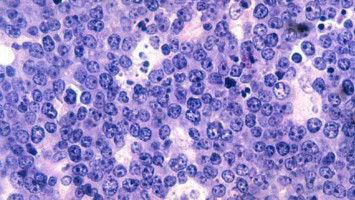
National Institute for Health and Care Excellence (NICE) has recommended brentuximab vedotin with cyclophosphamide, doxorubicin and prednisone (CHP), within its marketing authorisation, as an option for untreated systemic anaplastic large cell lymphoma (sALCL) in adults, within a final appraisal document (FAD).
sALCL is a rare and clinically aggressive disease.
It can be difficult to diagnose, meaning many cases are not identified until Stage III or IV.
The frontline treatment for newly diagnosed sALCL patients has typically been multi-agent chemotherapy, such as CHOP (cyclophosphamide, doxorubicin, vincristine, prednisone), which is generally associated with poor outcomes, with many patients failing to achieve long-term survival.
Clinical practice guidelines also recommend inclusion in clinical trial as a frontline option for sALCL, further highlighting the need for novel therapies.
Stephen Scowcroft, Director of Operations and External Affairs, Lymphoma Action said: “Being diagnosed with a rare type of lymphoma, like systemic anaplastic large cell lymphoma, can have a significant impact on the quality of life of patients and their family or friends. Not only can the disease and the current treatment options have a physical impact, but the psychological impact of being diagnosed with a rare cancer, with potentially poor outcomes, can be devastating. That is why we are really pleased that newly diagnosed patients can now have access to an effective treatment, that can improve their quality of life and outcomes.”
The recommendation from NICE, which reflects the marketing authorisation extension from the European Commission, is based on the results of the Phase 3 ECHELON-2 study evaluating brentuximab vedotin in combination with CHP, compared to the current standard CHOP chemotherapy, in patients with CD30 PTCL.
sALCL is a type of PTCL and 70% of patients included in the ECHELON-2 study had sALCL.
In the sALCL patient population, brentuximab vedotin plus CHP demonstrated superior progression-free survival (PFS) and overall survival (OS), versus CHOP, as assessed by Blinded Independent Central Review (BICR) (Hazard ratio [HR]=0.59; p-value=0.0031 and HR=0.54; p=0.0096, respectively).
This corresponds to a 41% reduction in the risk of a progression event and a 46% reduction in the risk of death.
ECHELON-2 also found that brentuximab vedotin in combination with CHP demonstrated:
Tim Illidge, Professor of Targeted Therapy and Oncology at The Christie NHS Foundation Trust said: “Progress in improving outcomes in the frontline treatment of sALCL has been lacking for decades and there has been an urgent medical need to improve survival . Historically, there has been a significant risk of rapid relapse and no effective re-treatment options. The data seen in this large Phase 3 randomised trial with brentuximab vedotin plus CHP in the untreated sALCL patient population is practice changing and has the potential to significantly improve the chance of survival for patients. This is the first large randomised study in T cell lymphoma to show real clinical benefits, providing new hope for patients fighting this aggressive disease.”
Brentuximab vedotin is already available as a monotherapy for adult patients with relapsed/refractory sALCL in England, Wales and Northern Ireland after failure of at least one chemotherapy agent.
Jon Neal, Managing Director, Takeda UK & Ireland said: “Brentuximab vedotin is a medicine that continues to innovate and transform the treatment paradigm for patients with rare types of lymphoma. We are committed to working in partnership with the clinical and patient community, and NICE and NHS England, to ensure as many eligible patients can benefit from access to this medicine as possible. We are therefore delighted that NICE recognised the significant benefit that brentuximab vedotin can bring to patients with this aggressive disease and we hope this rapidly becomes the new standard of care.”
Source: Takeda
Watch our interview with Dr Trümper on the ECHELON-2 study here.
We are an independent charity and are not backed by a large company or society. We raise every penny ourselves to improve the standards of cancer care through education. You can help us continue our work to address inequalities in cancer care by making a donation.
Any donation, however small, contributes directly towards the costs of creating and sharing free oncology education.
Together we can get better outcomes for patients by tackling global inequalities in access to the results of cancer research.
Thank you for your support.